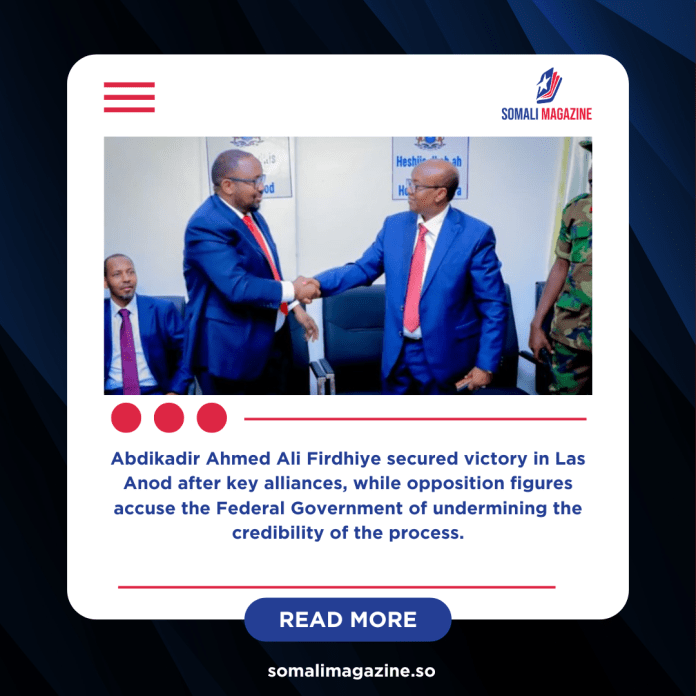Facebook Twitter (X) Instagram Somali Magazine - People's Magazine
Somalia’s newly established Northeastern state has officially chosen its first president, marking a critical step in the region’s political transition. Abdikadir Ahmed Ali Firdhiye, the former interim leader of SSC-Khatumo, was elected on Saturday in Las Anod after a hotly contested race that drew both local and national attention.
The election was seen as a defining moment for the state, which has been in the process of forming an administration since July. Firdhiye’s victory was not a surprise to many observers, as he had built strong alliances and enjoyed backing from powerful figures during the campaign. His win cements his leadership role, having already served two years as interim president of SSC-Khatumo before the formation of the Northeastern state.
How the Election Unfolded
Firdhiye’s main challenger, Abdirisaq Khaliif Ahmed, was forced to withdraw after a dramatic turn of events in the first round of voting. Jamal Mohamed Hassan, another prominent candidate, shifted his support to Firdhiye, transferring his votes in a move that effectively blocked Khaliif from advancing. This political maneuvering cleared the way for Firdhiye’s straightforward victory and confirmed his position as the leading contender.
Alongside the presidential election, the state also held a vote for vice president. Abdirashid Yusuf Jibriil, the former speaker of the Puntland Parliament, emerged as the favorite. Known not only for his political experience but also for his background as a poet, Jibriil is a close ally of Firdhiye. His candidacy was strongly supported within the same political circles, making his success almost certain.
Federal Government’s Influence Sparks Debate
Despite the smooth announcement of results, the election has not been without controversy. Several opposition candidates and local leaders have accused Somalia’s Federal Government of meddling in the process. They claim government officials actively campaigned in favor of Firdhiye and even went as far as bribing lawmakers to secure his victory.
“The government’s interference undermines the credibility and transparency of this election and could derail the process of forming a viable administration,” one opposition candidate told local media.
Critics argue that the heavy involvement of Mogadishu could weaken trust in the new state institutions and alienate communities who feel excluded from the process. For many, the election was not just about leadership but also about proving that the Northeastern state could govern itself fairly and independently.
The Federal Government has so far remained silent on these allegations, neither confirming nor denying its role in the outcome. This silence has fueled more speculation and resentment among opposition groups.
A Step Toward Stability, But Challenges Remain
The election represents the final stage in establishing an official administration for the Northeastern state, which emerged out of efforts to provide governance for communities in and around Las Anod. Leaders and citizens alike see the new administration as a chance to address long-standing issues such as security, infrastructure, and economic development.
Firdhiye’s leadership will be closely watched, both within Somalia and internationally. Supporters believe his previous two years of experience as interim leader will help him stabilize the state and build a functioning government. However, critics warn that unless allegations of external interference are addressed, the administration risks starting off on shaky ground.
The presence of Abdirashid Yusuf Jibriil as vice president could help Firdhiye consolidate power, as the two men share political vision and loyalty. Yet, the challenge will be to show inclusivity and fairness in governance to prevent further division.
Looking Ahead
As the dust settles on this highly scrutinized election, attention now shifts to how the new administration will govern. Firdhiye will need to balance competing interests, manage strained relations with opposition figures, and reassure communities that their voices will be heard in shaping the state’s future.
For ordinary citizens in Las Anod and beyond, the hope is that this election will finally bring stability, representation, and progress. But with suspicions of interference lingering, the success of this new chapter in Somalia’s political story will depend on how well the Northeastern state can prove its independence and earn the trust of its people.

